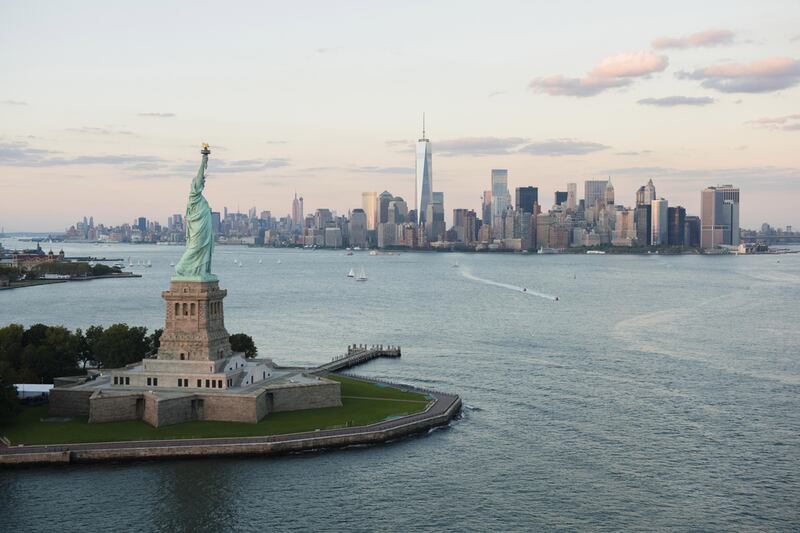Dar Global, the global arm of Saudi Arabia’s biggest developer Dar Al Arkan, plans to buy property in the US and other countries, in a growing trend among Middle East investors to capitalise on opportunities rising in the US market.
The company, which is teaming up with the Trump organisation to develop a residential project in Muscat, is active in six countries – the UAE, Oman, Qatar, the UK, Spain and Bosnia – with projects under development worth $5.9 billion.
It aims to expand into newer markets as part of its growth strategy. In the US, the company plans to buy property in Miami and New York, chief executive Ziad El Chaar told The National in an interview.
“Miami, which used to be one type of market for mainly Latin Americans, now is attracting investment and buyers from all over the globe,” he said. “This is why we are looking at the market in Miami.”
Dar Global is also looking to work with a developer to buy projects in New York, the financial and economic centre of the US.
He did not divulge details about what kind of projects it plans to buy.
However, in New York, the company is working with some developers to “reactivate projects that have been launched before but were not completed”.
Middle East investors have shown growing interest in US real estate. Last week, Bahrain-based asset manager Investcorp announced it was teaming up with two sovereign wealth funds to form a $526 million fund to invest in industrial real estate in the US, where the company sees “attractive” opportunities to grow its footprint.
Bahrain's Arcapita is also investing in the US and has investments in the industrial and logistics sectors, as well as housing for senior citizens.
GFH Financial Group in Manama, which acquired a student housing portfolio in 2021, exited the asset last year, delivering total proceeds of 122 per cent to investors, it said in December.
From the UAE, the Abu Dhabi Investment Authority, one of the world's biggest sovereign wealth funds, is also investing in US real estate.
In its annual report last year, the fund said it remained committed to its existing urban logistics exposure in the US, Europe, Australia and China, and was exploring further selective investments.

In London, Dar Global aims to launch a project with another developer or acquire projects ready for sale from other developers.
In Saudi Arabia, it is bidding for a new plot of land in Riyadh to build a 400-villa project.
“There is a building global interest in investing in real estate in Saudi,” amid the kingdom’s new residency programme, Mr El Chaar said.
Earlier this year, Saudi Arabia launched five visas to attract skilled professionals and investors as the Arab world’s biggest economy seeks to strengthen its position as a global centre for business.
The new visa categories – special talent, gifted, investor, entrepreneur and real estate owner residency – will offer holders “unparalleled opportunities for settling in Saudi Arabia”, Majid bin Alkassabi, chairman of Saudi Arabia’s Premium Residency Centre, said in January.
The new initiative also allows permanent residency in the kingdom with 4 million Saudi riyals ($1.1 million) of investment in property, according to Mr El Chaar.
The company aims to finance new projects through its own money and by borrowing from the market.
“We've ended the year with a fee cash position of $220 million and we still have not utilised yet the support that our parent company pledged to support us in terms of funding for acquisitions.”
The US market is also “very active in funding developers with a good balance sheet like ours … and the balance sheet of our parent company”.
Dar Global was established in 2017 to manage the Saudi developer's international assets. It focuses on developing premium properties, such as luxury second homes and holiday homes. Last year, it raised $72 million from its listing on the London Stock Exchange.
It reported $83.2 million in profit for 2023, compared to a loss of $5.2 million in the previous year, as revenue surged more than four times to $360.6 million on the back of the sale of homes from its projects globally.
The company is also looking to start a new project in Dubai this year – its fifth in the emirate – amid higher demand.

Dar Global is currently developing projects worth $1.03 billion in Dubai. Most of the more than 1,200 units it is building were sold to customers from 90 nationalities, with people from the Indian subcontinent and the UK dominating the list. It is also developing new projects in Qatar and Oman.
The company has teamed up with the Trump Organisation to develop a $4 billion complex that will include residential villas, a hotel and a golf course in Muscat.
Mr El Chaar is optimistic about the GCC real estate market amid new initiatives from regional governments to attract investors.
“I see a very big demand for GCC … whether we talk about Dubai, Abu Dhabi, Ras Al Khaimah, Doha, Jeddah, Riyadh, Muscat … they are building so many attractive opportunities and so many amenities and [making] investment in infrastructure to bring on more international investors and international vacationers as second home buyers,” he said.
The UAE introduced initiatives such as residency permits for retirees and remote workers, in addition to expanding its 10-year golden visa programme, which has helped the property market to rebound from the Covid-induced slowdown.
Dubai registered a record 1.6 million property transactions across all market segments last year, up 13 per cent on the previous year, while the value of deals rose by 20 per cent annually to Dh634 million.
Abu Dhabi's property market also continued to maintain its growth trajectory amid higher demand from buyers.
The ValuStrat Price Index, which analyses changes in property values, grew by 4.2 per cent annually for the UAE capital last year.







